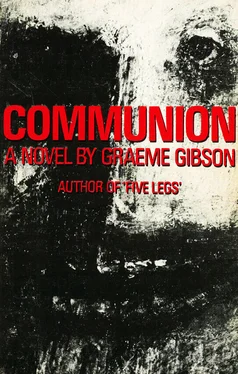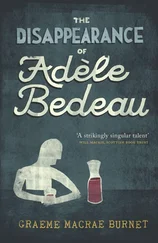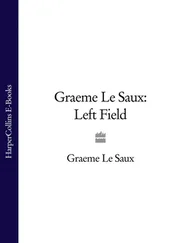For
Selena,
Jake L. and Peter C.
For thinkers putting together a philosophical outlook to guide the Green Revolution, Graeme Gibson asks the fundamental question: how can we clean up our global campsite without destroying the planet further? Even when introducing species to restored habitats, we must rely on technology, thereby distancing our humanity from Earth and consolidating us in the role of her manager. This is an arresting question for a former council member of World Wildlife Fund Canada to ask — but Gibson is also a novelist, and even more startling is the alternative he explores in Communion . The alternative is to dream ourselves into the spirit society we have hitherto called “wilderness” in a way that leads to our own dignity as earthlings. Yet this visionary impulse is immediately betrayed by technology, leaving in the case of Communion five impotent dreamers trying to survive as shamans.
Who in this book of interwoven vignettes is the protagonist, the one who suffers our agony for us? Is it the part-time veterinary assistant who tries to return a husky to the wild? Is it the dog with its once wild nature reduced to a flickering dream behind its eyes? The assistant identifies with this domestication of instinct, being pulled out of his own fetal dreaming every morning by a woman who asserts the material world on his senses, materia as mater. His only recourse is to paw the statues of grieving nymphs in a cemetery whose Stygian waters contaminate the nearby ravine. Is the protagonist an individual curled up around himself on a basement floor, so paranoid with fantasies of children and guns he is barely able to “rise onto all fours”? Another paralyzed dreamer, “he misses nothing even though his face is turned inward to the wall” (Gibson’s protagonists aren’t objective people so much as spirits inhabiting bodies, or trying to get back to them through sexuality). Is it a voyeur who sends his spirit out nightly through the walls of houses in search of a woman’s touch? Or is the protagonist a normal, if brooding, individual shuttling across the ravine between the sorrow of a wife and the morose delight of a mistress, both asking: “Why am I always attracted to empty men?”
Or is the protagonist of Communion the ravine, a strip of wilderness extending into the heart and loins of a city, filling the people who live on its edges with the “uncertainty and dread” of a dark existential choice?
To readers of literature, this book is one of the finest experiences of polyphonic storytelling this side of the Sirens episode in Ulysses . Polyphony denotes a composition in which multiple voices or instruments pursue their melodies independently, each keeping its ear on the others, none of them dominating the whole it helps to create. As such, Communion is a literary string quartet — a decided alternative to the symphonic megaproject called the novel and to its political equivalent, the hegemony imposed in the name of social harmony. As an ornithologist, Gibson is tuned to the natural polyphony of the forest, where songs pass through each other or respond in duets and sudden choruses, and he offers brief glimpses of this primal. But the book seems to leap back in time beyond Romanticism to shamanic myth with its narrative polyphony of human, animals, and spirits sharing the same stage without a master-script. Communion is an enactment of bodies as the visible arcs of spirits, trying to recover an earthly paradise in the density of time and space.
Sean Kane
February 2013
Space is always between us
and time is inserted in us like a disease.
Barbusse
Why does she come each morning like this? A ritual perhaps, but not for him: he’s happy enough beneath the covers, arms against his body, hands together at his throat.
Christ knows he doesn’t need it! with knees pulled up under his chin for protection, the body curled around its own belly like this, anyone can see he doesn’t need it. Yet here she comes with cigarettes, matches and the white plastic holder . . .
Why?
Deliberately from the door to the chair beside his face and sitting, staring impassive as he sleeps. She hears her spring morning at the open window. She hears birds in the eaves and she hears the trees, a car door slam. She hears the starter before the engine catches, then she listens to hear acceleration to the corner; tipping her ear slightly, she squints her eyes after the diminishing sound. It doesn’t take long. And then there’s only the city and the imperceptible sound of his body’s sleep.
She rises, she puts the cigarettes, the matches and the holder beside his pillow and, bracing her feet on the floor, her knees against the bed, she takes a deep breath and tries to wrestle him onto his back. He resists. She tries harder. He curls in upon himself like an armadillo, but grunting and clutching, sweating now and heaving, she begins to gain the advantage: he’s weakening, one of his arms comes loose: vainly he struggles to re-enclose himself but the circle’s broken . . . it’s just a matter of time. She hears a high-pitched whimpering in his throat, and knowing the muscles that strain in his chest, the burrowing face, she pauses. Clever. With left hand on his right wrist, elbow against his belly and into his hip, and her right arm under his shoulders, she seems to give in to him. Very clever. His body, surprised at this unexpected freedom, relaxes (will it never learn?), the whimpering dies . . . and at this instant, so beautifully timed, she surges to her feet and grunting flips him onto his back.
Things proceed as usual.
Felix open on his back, he breathes the end of sleep . . .
Cigarette in her mouth, she rests. It’s getting harder all the time, she isn’t getting one bit younger: once it was strength alone that did it, she walked in at seven and simply rolled him over. But those days are gone now: more and more she has to rely on the advantage that comes with experience. But then he’s more stubborn too . . .
She lights a cigarette and slips it into the holder. There are birds outside and trees that press about the house: the sun is shining, rather pale at this hour, but shining nevertheless as she leans forward to brush her finger lightly at the corner of his mouth. He shivers, he searches blindly with a sucking noise, his face is pained, is drawn in lines as his mouth searches suck suck. Such an anxious face!
By resting her elbow at his side she keeps the holder steady; her arm along his chest, she bends and reaches, pinching the nostrils to stop him breathing through his nose. It’s the only way. Otherwise he simply puffs, breathing sleepily all the while, and the smoke scarcely passes his lips, hardly gets into his mouth, let alone into his lungs where it’s needed, where it does the most good. The effect is immediate. The tip glows more brightly, it fades to greyness, then it glows again, it fairly crackles! Miniature forms collapse upon themselves as he exhales. But the rhythm’s still uneven, it’s not bad, a beginning, but uneven . . .
Sometimes the smoke goes down the wrong way, gets into the gullet or whatever and he’s overcome, he’s doubled up and blue with the lack of air. It was frightening at first, she used to think he was actually going to die, but since he never did she’s learned to put up with unexpected things from time to time. One morning last winter he wouldn’t open his mouth to take the cigarette. Even when she held his nose shut tight he wouldn’t open up . . . his body heaved, convulsed as if to make sure there was no way, and then he just lay there turning greyer and greyer until a purple ring appeared about his mouth. Terrible, as if he didn’t care, he was so calm, he didn’t move and she panicked. It was the spreading private bruise, that blackening beneath the skin, she couldn’t look away, she could only stare . . . and growing certain that he’d finally win, she lost her head completely. She savagely pinched at his nose, twisting the holder she tried to pry his body open at the mouth, she pleaded and coaxed, she cursed him, she promised intolerable things but he wouldn’t hear, he’d simply stopped breathing. And he wouldn’t have started again, she’s sure of that, if she hadn’t reached between his legs and gathered his genitals in her hand. She gave a tentative pull . . . unconvincing . . . so she squeezed, violently she twisted until he bellowed, he gasped, he started to breathe . . . and before he could close again she’d pushed the mouthpiece in and won!
Читать дальше












